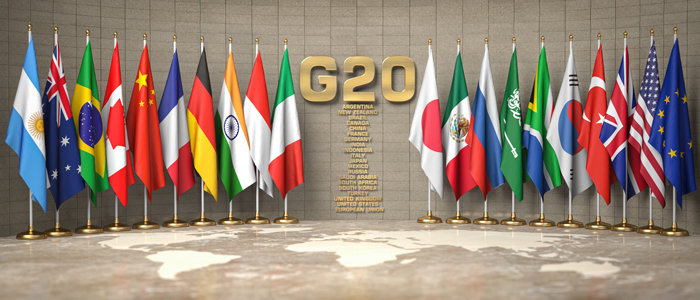Free Riding, Tipping Points and the G20: will lessons be learned from the catastrophic global failures in COVID-19?
The G20 Leaders’ Summit will be held in October in Rome. Prompted by the Asian economic crisis of 1997, the G20 was formed in 1999 " to broaden the dialogue on key economic and financial policy issues among systemically significant economies and to promote cooperation to achieve stable and sustainable world growth that benefits all".

The countries represented in the G20 account for about 85% of the global domestic product. In principle, an effective global coordination mechanism, especially (but preferably not exclusively) involving those countries with the greatest influence over the global economy, is exactly what the world has needed. Economists have long recognised the lack of incentives for individuals to contribute to investments in public goods as private individuals – to keep the streets clean or provide street lighting for example. We value the goods but we’d rather let others invest. In other words we want a ‘free ride’ and these goods, from which we all ultimately benefit, will only be provided if we act collectively. To address global public goods – for example to prevent the emergence and spread of infectious disease, protect the world from climate change, reduce violent conflict and regulate capitalism to provide economic opportunities for all – nation states need to act collectively and create incentives for individual nation states to eschew the free ride.
Nevertheless, the Leaders’ Summit has in the past prompted large and vociferous protests, and will almost certainly do so again. The reasons are clear. The idea that sustainable world growth has benefited all has become increasingly implausible over the period since 1999. Globally, two groups have gained substantially from globalisation since 1988 according to Lakner and Milanovic’s ‘elephant curve’: the wealthiest decile of the world’s population, and a globally middle-income group has benefited from the emergence of expanded manufacturing and technology industries in middle-income countries. Within high-income countries, inequalities have almost monotonically and universally surged. Contributing to this problem is the capacity of the richest individuals and corporations to avoid taxes by moving assets to the lowest tax jurisdictions – an example of a free-riding problem that requires concerted collective action to address.
Against this backdrop of increasing concentration of the benefits of globalisation among a wealthy few, the model of growth that underpins it has also failed to respond to the ever more urgent evidence of environmental degradation and climate change. The most recent report of the Intergovernmental Panel on Climate Change confirming that climate change is ‘widespread, rapid, and intensifying’ has been released as the US simultaneously faces extreme heat-fuelled wildfires in California, Hurricane Ida devastating Louisiana, and it continues to recover from drought and heatwave across its Western States earlier in its Summer. Here in Australia, memories of the 2019-20 bushfire season are still fresh, and the condition of the Great Barrier Reef continues to be critical but neither has prompted the Morrison government into a retreat from its free-riding response. Securing the future of the planet will rely on a collective global effort and the G20 should be a key part of that.
As I write this piece, the G20 Health Ministers’ Meeting planned in the lead up to the Leaders’ Summit is opening. Clearly COVID-19 will dominate their agenda which has 3 sessions: the first on the impact of COVID-19 on the SDGs, the second on improving preparedness for future pandemics and the third on the immediate issues in managing the response to the current pandemic. The meeting should help Ministers to filter the glut of science, interpretation, opinion and nonsense on all these subjects that is circulating. What ought to take central stage is the importance of global coordination and the abject failures of global coordination that have produced the Delta strain – investing in a coordinated global response rather than piecemeal responses at the nation state level could have prevented its emergence and in the presence of effective vaccines, we could certainly now block the appearance and spread of even more deadly strains. But there is little sign of an adequate globally focused response emerging.
One risk is that the health ministers’ meeting will fail to join the dots with the larger summit. COVID-19 not primarily a health problem but a problem arising from the global model of economic development. Strategies to prevent the next pandemic are the same ones as those that will deconcentrate wealth and modify climate change. Trillions of dollars have been spent in response to COVID-19 and billions of dollars have been spent and lost in the last year alone on bushfires, heatwaves, hurricanes and drought. But if the lessons pointing to the need for fundamental change of the economic system are not learned, then trillions more will be spent responding to the next crisis and the next and the next and the next, and livelihoods across the planet, not only but first and most catastrophically in the most precarious regions, will increasingly be unsupportable.
Has COVID-19 shaken the complacency of the leaders of the G20 nations into taking joined-up steps to address the multiple crises the world is facing with a scale and ambition that might make a difference? Optimism might lie in a tipping point prognosis – politicking and pressurising may be appearing to have no effect at all until suddenly the edifices that resist it all collapse, and change happens rapidly. What one day seems impossible seems inevitable the next – we may be in such a moment.
This article was written by Professor Barbara McPake, Director, Nossal Institute for Global Health,
Sign up to Issues in Global Health to receive regular thought pieces on current issues in Global Health delivered to your inbox.
More Information
Professor Barbara McPake, Director, Nossal Institute for Global Health